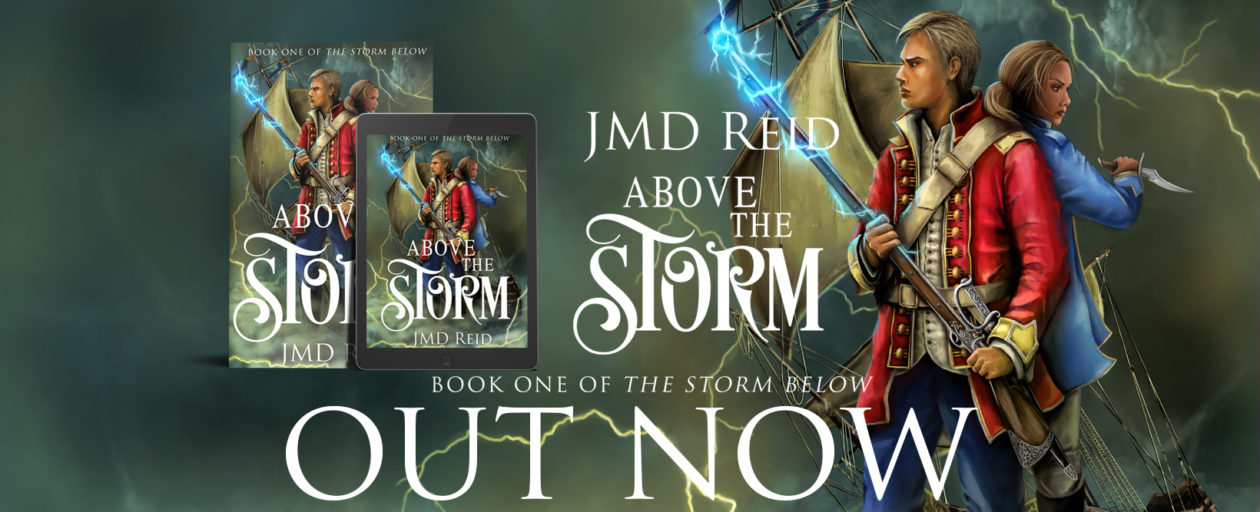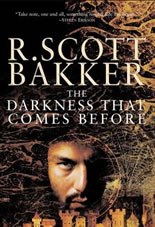Reread of Prince of Nothing Trilogy
Book 1: The Darkness that Comes Before
by R. Scott Bakker
Part 1
The Sorcerer
Chapter 2
Atyersus
Welcome to Chapter Two of my reread. Click here if you missed Chapter One!
I write to inform you that during my most recent audience, the Nansur Emperor, quite without provocation, publicly addressed me as “fool.” You are, no doubt, unmoved by this. It has become a common occurrence. The Consult eludes us now more then ever. We hear them only in the secrets of others. We glimpse them only through the eyes of those who deny their very existence. Why should we not be called fools? The deeper the Consult secretes itself among the Great Factions, the madder our rantings sound to their ears. We are, as the damned Nansur would say, “a hunter in the thicket”— who, by the very act of hunting, extinguishes all hope of running down his prey.
—Anonymous Mandate Schoolman, Letter to Atyersus
My Thoughts
This reminds of a quote from the Usual Suspects, “The greatest trick the devil ever pulled was convincing the world he did not exist.” Apparently the consult saw that movie. If it wasn’t for our expectations of fiction, and Fantasy in general, we know the consult is out there. Of course, we had something very strange in chapter one happen with the abomination. Perhaps we are glimpsing why the Consult has eluded the Mandate for so long.
Late Winter, 4110 Year-of-the-Tusk, Atyersus
Achamian stands before the Quorum, the ruling council of the Mandate. The Quorum studies Achamian for a long while before Nautzera, a member of the Quorum, speaks. Nautzera explains that since Maithanet has become the Shriah (Pope) to the Thousand Temples, he has stirred something up and cannot be ignored. All of the Cults support him without the usual political machinations.
“But surely we’ve seen his kind before,” Achamian ventured. “Zealots holding out redemption in one hand to draw attention away from the whip in the other. Sooner or later, everyone sees the whip.”
Nautzera disagrees. Maithanet moves faster and with more cunning. He uncovered two assassination plots and exposed agents of the Emperor. Achamian finally understands why he was summoned. Maithanet is rocking the boat, or as the Nroni put it “pissed in the whiskey.” Nautzera then tells Achamian there is to be a holy war. Achamian asks if it is against the Fanim. However, in the history of the Three Seas there had been only two other holy wars, both against the Schools (like the Mandate). These wars were known as the Scholastic Wars and were costly to both sides. Nautzera says the Cultic Priests are again calling sorcerers Unclean.
Unclean. The Chronicle of the Tusk, held by the Thousand Temples to be the very word of the God, had named them thus—those Few with the learning and the innate ability to work sorcery. “Cut from them their tongues,” the holy wards said, “for their blasphemy is an abomination like no other …” Achamian’s father—who, like many Nroni, had despised the tyranny exercised by Atyersus over Nron—had beaten this belief into him. Faith may die, but her sentiments remain eternal.
Simas, Achamian’s mentor and friend, explains that a holy war against the Fanim is doomed to failure. Kian, the only Fanim nation, also possess the Cishaurim. The Thousand Temples and Inrithi allies could field ten thousand soldiers equipped with Chorae, making them immune to sorcery. Chorae are the only check on the power of the Schools and the sorcery. Achamian points out those Chorae are equally effective against the Cishaurim. Simas, however, disagrees.
“Because between those men and the Cishaurim would stand all the armed might of Kian. The Cishaurim are not a School, old friend. They don’t stand apart, as we do, from the faith and the people of their nations. While the Holy War struggled to overcome the heathen Grandees of Kian, the Cishaurim would rain ruin upon them.” Simas lowered his chin as though testing his beard against his breastbone. “Do you see?”
Achamian, like all Mandate, remembers the dreams of the Fords of Tywanrae where the Consult used sorcery to annihilate their enemies. Nautzera comments that Maithanet is not an idiot and will know he cannot win a war against the Fanim. Achamian asks why he was recalled. The Quorum need Achamian to travel to Sumna and find out the target of the Holy War. Achamian lies and says he no longer has any contacts in Sumna, though his thoughts turn briefly to Esmenet, a whore he knew and one other.
Several years ago, Achamian had a student named Inrau who he was training to be a Mandate Sorcerer. However, Inrau was to innocent to survive becoming a Mandate and wanted to be a Shrial Priest. He had, however, learned to much to be allowed to leave. Achamian loved his student, however, and faked his death and allowed Inrau to leave. Achamian only confided in Simas about his betrayal. Nautzera reveals that he knows of Inrau’s defection and that he is a Shrial Priest in Sumna. Achamian is stunned by Simas’s betrayal.
Nautzera wants Achamian to turn Inrau into a spy for the Mandate against the Thousand Temples. Achamian refuses, believing it would be to much for Inrau to handle. Nautzera accuses Achamian of sedition. Nautzera points out that the Consult may be behind Maithanet and that the life of Inrau would be worth it to find out. Achamian concedes the point only if the Consult really has returned.
“Ah, yes. I’d forgotten that you numbered yourself among the skeptics. What is it you say? That we pursue ghost.” He [Nautzera] held the word in his mouth, as though it were a morsel of questionable food. “I guess, then, you would say that a possibility, that we’re witnessing the first signs of the No-God’s return, is outweighed by an actuality, the life of a defector—that rolling the dice of apocalypse is worth the pulse of a fool.”
Achamian is prepared to face Sanction for allowing Inrau to defect. Nautzera continues his rant against the skeptics, reminding Achamian that the Mandate are not the other schools. While they spy and perform political machinations, it is to support their war against the Consult not to increase the Mandate’s power. “You [Achamian] confuse us with the whores.”
Simas steps in, and points out the Dreams have become more intense. What better vehicle for the Consult to seize power then through the Thousand Temples? Use it to destroy the Mandate through a Holy War. Achamian is wracked with doubts. Nautzera points out that Inrau may understand the stakes. That it would be possible to convince him without using Cants to compel him. Finally, Nautzera says if Achamian won’t go, another less sentimental Mandate spy would be sent.
Later, Achamian stands on the battlements of Atyersus and looks out at the sea and broods on the meeting. The Quorum meeting went on longer after Achamian agreed to the mission. Nautzera continued to berate Achamian, asking if Achamian forgot that the Old Names still resided in Golgotterath. Achamian wanders if the concerns of the present crowded out the portents of the past. Nautzera, on the other hand, dwelt in the horrors of the past and the threat of the future. The present was a mere formality.
And why not? The anguish of the Old Wars was beyond description. Almost all the great cities of the Ancient North had fallen to the No-God and his Consult. The Great Library of Sauglish ransacked. Trysë, the holy Mother-of-Cities, plundered of life. The Towers of Myclai pulled down. Dagliash, Kelmeol … Entire nations put to the sword.
To Nautzera, Maithanet was signification because he might be the start of the Second Apocalypse. Achamian is troubled by the idea the Shriah could be an agent for the Consult and lead a Holy War against the Schools.
Achamian reflects on his relationship with Inrau. Inrau had reminded Achamian of the first student he loved, Nersei Proyas. However, Proyas had grown proud with the knowledge that he would become King someday. Inrau, however, remained Inrau. Achamian loved Inrau because he was good. Inrau was open like a child or a fool, possessing an innocence of wisdom instead of ignorance. Inrau saw beauty in all things and forgave men their blemishes.
Achamian was dismayed and relieved when Inrau chose to abandon the Mandate. Achamian knew the Mandate would eventually destroy his innocence. Achamian remembered the night he touched Seswatha’s Heart and his world was transformed by the tragedy of history.
How could such innocence, any innocence, survive the terror of Seswatha’s Dreams? How could one find solace in mere sunlight, when the threat of the No-God loomed across every horizon? Beauty was denied victims of the Apocalypse.
Achamian considered securing Inrau’s escape the only good act he did in his life. Achamian wanders how long the Quorum knew of his betrayal and if Simas had truly betrayed him. Nautzera message to Achamian was plain, Inrau was a defector and deserved to die. Inrau knew enough of the Gnosis for another School to capture and torture him, eventually discovering the secrets. Then the Mandate would then be condemned to being a Minor School.
Had he done the right thing? Or had he simply made a wager?
Was the pulse of a good man worth rolling the dice of Apocalypse?
Nautzera had argued no, and Achamian had agreed.
The Dreams. What had happened could not happen again. This world mus not die. A thousand innocents—a thousand thousand!—were not worth the possibility of a Second Apocalypse. Achamian had agreed with Nautzera. He would betray Inrau for the reason innocents are always betrayed: fear.
Achamian reflects on how long it had been since he had been to Sumna. Five or more years, and wonders if Esmenet still lived. She always eased his heart. And to see Inrau, to warn him of his failure. Achamian yearned to see those two people he loved again and longs to be just a man.
Later, Nautzera watches Achamian leave Atyersus on ship from the battlements. Nautzera sees storm clouds in the distant and knows it will be a rough voyage to Sumna. But he knew Achamian would survive thanks to the Gnosis. Nautzera heads back inside and goes to the library were he finds Simas reading by lantern light. Nautzera is jealous that Simas eyesight hasn’t failed him in old age. Nautzera, like others his age, needs an acolyte to read for him these days.
Nautzera confronts Simas, saying they should have told Achamian they already know who Maithanet has called the faithful to war against. Nautzera knows the deception as necessary to motivate Achamian to betray his student, but it doesn’t sit well with Nautzera. Simas disagrees, saying the Consult has taught him that ignorance is a powerful tool. Nautzera counters that knowledge is more powerful. Achamian may run into trouble because he will not be alert. Simas is dismissive, saying Achamian will be careful at the heart of the Thousand Temples.
Simas then asks Nautzera if he has heard the new report. Simas had an uncanny ability to read what troubled Nautzera. Nautzera answered that Parthelsus’s primary informant in Tydonni vanished. Someone is hunting Mandate agents. Simas thinks its the Consult. Nautzera says it could be the Scarlet Spires or the Thousand Temples. Nautzera thinks Achamian should be warned.
Simas points out that their enemy is to timid or canny to strike directly at them. Achamian befriends his agents. He is weak. If he knew that Atyersus has been infiltrated and his contacts may be hunted, he would hesitate. Nautzera agrees that Achamian is weak, but it is Mandate policy to give autonomy to field agents, to trust their judgment. It doesn’t sit well with Nautzera denying Achamian knowledge that could save his life.
Simas answers that they have struck the right balance of with Achamian and points out he was right that Inrau’s defection would be useful. Simas asks Nautzera to trust him and says they have arduous tasks. Despite the Dreams, a Mandate Schoolman had turned traitor.
My Thoughts
Achamian doubts of his abilities are revealed through how self-conscience he is of his appearance. Because of the hardships of travel he has the appearance of a lowborn laborer instead of a noble sorcerer.
Unlike the Scarlet Spire which are ruled by a Grandmaster, the Mandate have a Quorum of presumably elder Schoolman. This gives a more democratic feel to the Mandate. Achamian stands up to the Quorum and only risks censure for his crime of allowing Inrau to defect, but not for objecting against the leadership.
Achamian loyalty to Inrau, his student, is one of Achamian’s best trait. Being a teacher is what Achamian is best suited for, he loves it. The Quorum uses Achamian’s love to compel him to turn Inrau to a spy is a low blow on their part.
The shadow of the Apocalypse covers everything the Mandate do. Like all fanatics, they will do reprehensible acts for the greater good. Achamian yearning to be just a man is understandable with the looming mission of turning innocent Inrau to spy on his own religion.
The scene between Nautzera and Simas is interesting. During the Quorum scene Simas is presented as Achamian’s ally and friend, Nautzera as the enemy. Yet all the decisions to lie to Achamian about his mission, to warn him that someone is murdering their informant, come from Simas. Despite his dislike of Achamian, Nautzera doesn’t want him going into a serpent’s nest unprepared. However, Simas reasoning appears sound, but there is something sinister about the old man. Maybe the fact that his caring routine is just subterfuge. Nautzera puts it as “the man [Simas] was as shrewd as he is devoid of sentiment.”
Also, interesting that Simas eyesight has not diminished with age.
This chapter does a great job setting up Achamian’s arc for the book. We saw in the last chapter the abomination killing Achamian’s newest recruit. And now we learn this is going on everywhere. The Consult, or another faction, has dangerous servants working for them. Something supernatural. And they war with the Mandate. Worse, they have a spy. Someone is feeding them information. Someone on the Quorum of which we only met two—Simas and Nautzera. And we had a POV from Nautzera.
It’s suspicious from a literary position. It is always possible an unnamed traitor is responsible or the Consult has another way of divining the Mandate’s agents. Until then, I would keep my eye on Simas.



